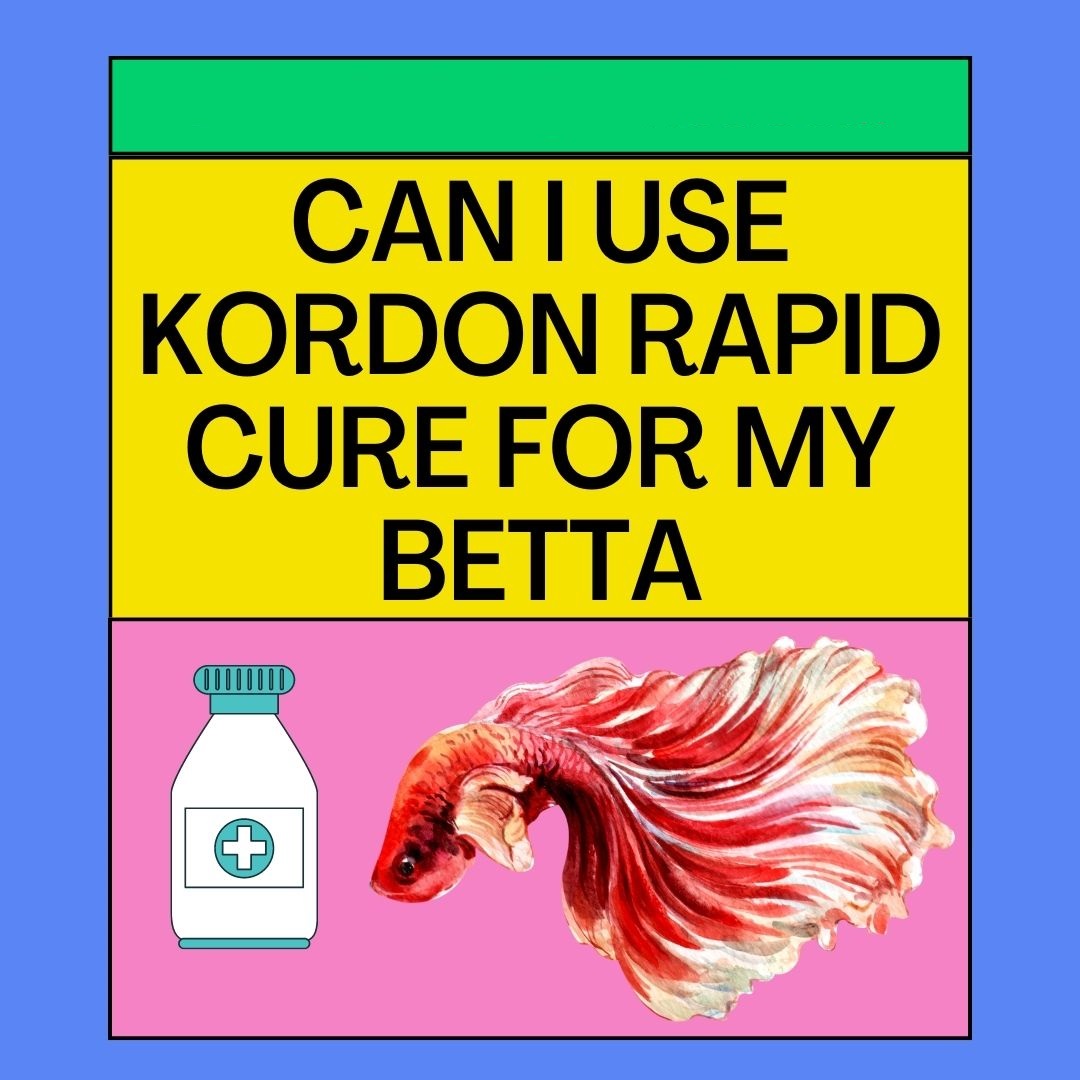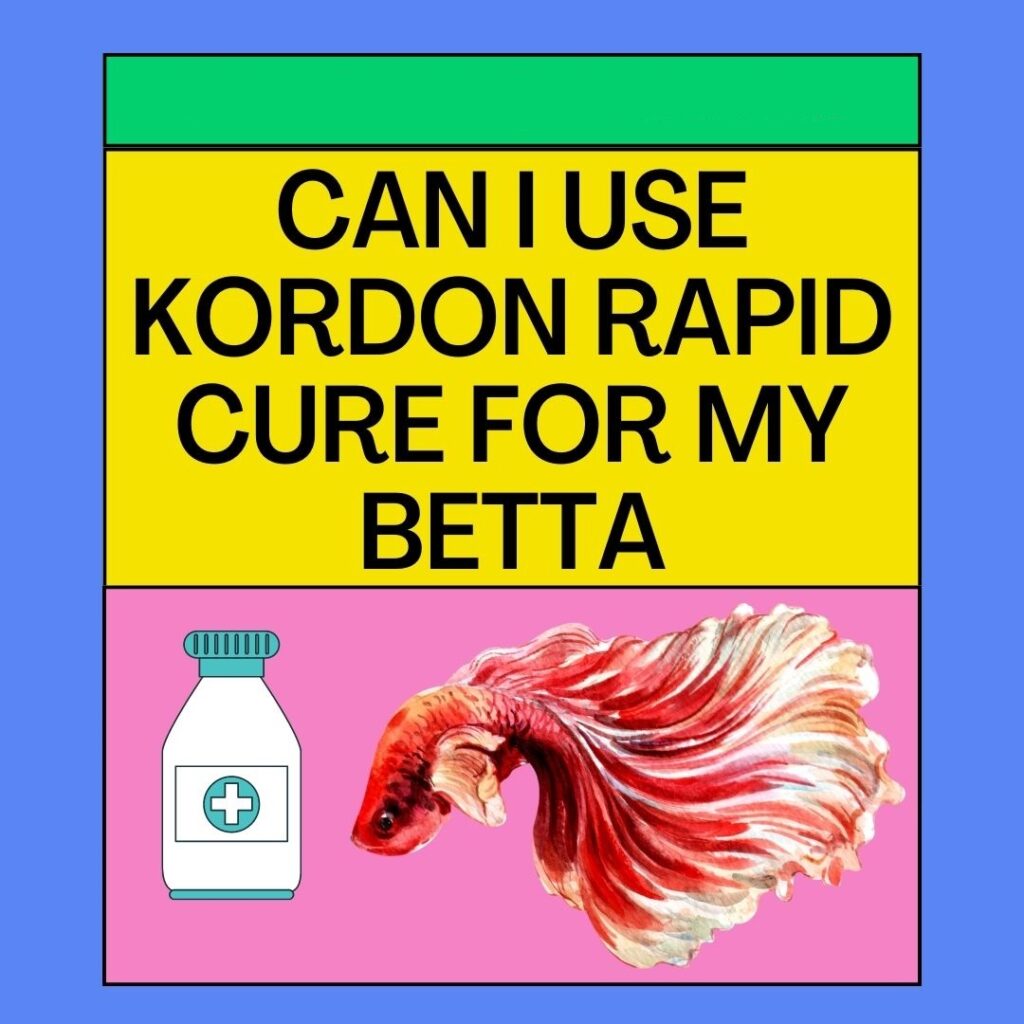
Bettas are a precious little part of your heart. If you see them sick, we know how worried you become. All you need to know now is how you can cure them.
So, it’s no wonder you looked up, “Can I use Kordon Rapid Cure for my Betta?”
Yes, you definitely can. But you have to know what is wrong with your Betta. Ich symptoms are relieved immediately with Kordon Rapid Cure. But it is not a universal medicine that cures every fish disease. So, first, find out what is actually wrong with your betta and treat them accordingly.
Although we have answered your question (and we have aced it!), you must still be clueless. You don’t need to be. Just calm down and keep reading this article. We promise, after you are done reading, you will find all the answers you need.

Can I Use Kordon Rapid Cure for My Betta?
Yes, you can. Kordon Rapid Cure is a well-known drop that can cure several diseases. But obviously, it is not something that can cure everything your betta might be suffering from. So, before using any chemicals, calm down, take a step back, and rethink the situation.
Kordon Rapid Cure can not relieve all kinds of symptoms. But what does Kordon Rapid Cure treat?
Kordon Rapid Cure is great for treating itches in your fish. It treats ich infections predominantly. Besides this, Kordon Rapid Cure can also treat fin damage and fight off protozoan parasites.
But you must know about the symptoms of ich in Betta fish. No problem. We will discuss this shortly.
Betta Fish Diseases Kordon Rapid Cure Can Treat
In this segment, we will be discussing all the diseases that Kordon Rapid Cure can treat. So, you can diagnose your Betta and decide whether to use Kordon Rapid Cure or not. Here we go.
Ich
One of the most prevalent diseases affecting Betta fish. It is also called “white spots.” Healthy Betta fish have a built-in resistance to it. But still, ich is found in the majority of aquariums and fish tanks.
But can ich be seen in the water? Experts say that you can. Not immediately, but after two-three days. But that’s another story, which we will discuss some other time.
Symptoms
The symptoms of ich in betta fish are mostly visible. Simply look for the symptoms we have mentioned below.
Ich parasites look like small salt or sugar granule-like spots. If your Betta is infected, you can see it all over their body, gills, and finnage. The number of white spots the betta fish has will determine the severity. These white patches are distinct from the “pimples” that betta fish occasionally experience.
Here are some other symptoms that will confirm if your Betta has white spots.
- Act lethargic.
- Refuse to eat.
- Rubbing against aquarium decor
- Fin or scale damage
- Clamped fins
- Laboured breathing
Causes
A stressed betta fish is more prone to developing ich. This can also happen if the aquarium is not inadequately heated or doesn’t have quality water. These are the most frequent reasons why your betta may fall victim to the Ich parasite.
Treatment
Yes, you already know what you will be using for this. But how to use Kordon Rapid Cure for ich in Betta fish?
- If there are other tank mates, transfer the betta to a hospital tank.
- For up to 10 days, gradually raise the temperature in your tank. But it should be between 81 and 86 degrees Fahrenheit. Ich parasites can reproduce more quickly and have longer life cycles in colder climates.
- An airstone should be added since warmer water stores less oxygen. The immune system of a betta fish can be strengthened by more oxygen.
- Then add the Kordon Rapid Cure to the water. The manufacturer recommends only one drop per gallon of water. Do not exceed this. Add this daily.
- Perform daily water cycling from 25% up to 50%. This is to lower high medicine levels and get rid of Ich trophonts and tomites,
- Do not stop the medication early. Continue even if the ich protozoan seems to be gone. They are only susceptible to medicine for two days out of their seven-day lifespan.
Prevention
Life would be a lot easier if this had not happened in the first place, right? That’s why we will now tell you how to prevent ich in fish.
Make sure you are providing your betta fish with the proper care and minimizing environmental stressors. Ich can attach itself to aquarium plants that are still alive. Do not forget to quarantine any new living plants or tank companions in a different tank.
After the quarantine, make sure to dispose of the aquarium water.
Protozoan Parasite Infection
Just like ich, this is also a parasitic illness. It starts on the fish’s exterior and spreads to its skin, blood, and gills. Like other similar illnesses, it can infect all the fish in a tank.
Symptoms
Your betta would appear to have gold dust or freckles spread around it. Other symptoms of velvet in Betta include-
- Heavy breathing
- Lethargy
- Clamped fins
- Rubbing against aquarium decor
Causes
Piscinoodinium, a protozoan parasite, attaches itself to the betta and finally pierces the skin. This disease is also known as “Velvet” or “Gold Dust Disease”.
Velvet can spread if there are conditions that favor the parasite. For example, cool water or excessive light. Also, conditions that weaken the immune system. For example, stress or poor water quality.
Treatment
Since this is also a parasitic infection, the treatment process is similar, too. Your betas should be fine if you just follow the treatment process for ich.

Prevention
Prevention of velvet in betta is easy. You can dodge this parasite by simply enforcing a quarantine protocol. Make sure you quarantine all new components in your aquarium for four to six weeks. That includes plants and decorations.
Fin Damage
Like the other two, this is also one kind of bacterial infection. In this case, the parasite will degrade and rot the fins and tail away.
Symptoms
As the name suggests, your Betta fins will appear damaged and rotten. Also, the edges of it may look bloody or darkened. If your fish are dark, you might have a hard time spotting them, so look attentively.
This disease does not have any other symptoms unless it is very advanced. If you suspect fatal fin damage, you should expect a loss of appetite and activity.
Causes
Fin rot is most frequently observed in aquariums that aren’t cycled or are filthy. In particular, tanks with very high levels of ammonia, nitrite, and nitrates are especially affected.
Fin rot outbreaks can also be brought on by unstable water characteristics. For example, high or low temperatures and pH levels. Due to their sensitivity, Bettas are susceptible to environmental stress. The fish’s immune system is weakened by such stress, increasing its vulnerability to bacterial illnesses.
Treatment
You must first change the environment of your tank to treat this disease. The root cause of this is environmental stress, so here is how you can do this.
- Test the aquarium’s water. Make sure the temperature is between 75 and 80 Fahrenheit. The pH level should be between 6.5 and 7.5. The water hardness level should stay between 3 and 4 dGH.
- Nitrate concentrations should be no more than 20 ppm. While ammonia and nitrite, levels should be zero. If these levels are too high, perform a partial water change right away. If the damage is not severe, this should be enough.
- If the damage is severe, you will need to use medication. In this case, it’s Kordon Rapid Cure.
- Before applying the medication, quarantine your infected fish in a clean and non-stressful environment.
- Apply the medication according to the manufacturer’s recommendation. Do not overdose on it and do not stop the medication earlier.
Things to Keep In Mind Before Using Kordon Rapid Cure
You know how you should treat them when they’re sick with the diseases we mentioned. But before you use Kordon Rapid Cure, keep these things in mind.
- Raise the temperature of the aquarium water to 82 to 84 degrees Fahrenheit.
- Before utilizing it, make sure your water quality levels are within acceptable limits.
- Decarbonize the filters.
- This treatment may cause inner surfaces like embellishments and silicone to discolor.
- In the event of an unintentional overdose, make a 50% water change. This also applies if the fish exhibits any signs of distress while being treated.
- Use only in aquariums without live rock, live coral, or live anemones.
In the case of Other Diseases
If your Betta is affected by some other disease, you shouldn’t use Kordon Rapid Cure. So, first, you must diagnose what is wrong with them. To do that, you have to know about other common Betta fish diseases.
FAQs
Is Kordon rapid cure safe for goldfish?
No, Kordon Rapid Cure is not safe for goldfish. In fact, do not treat any scaleless fish with Kordon Rapid Cure. Otherwise, it will cause more harm than good.
How do you use rapid cure?
For all freshwater fish (except those in the Tetra family) add 1 drop to each gallon daily. For Tetras, add 1 drop to every 2 gallons daily. In saltwater, add 1 drop to every 1 gallon on a daily basis. Change the filter carbon 24 hours after the last treatment.
Is Kordon Ich’s treatment good?
Yes, Kordon Ich-Attack is very effective. Especially as a remedy for skin conditions, wounds, and cuts. These infections frequently occur in combination, and Ich-Attack is an effective treatment for all of them.
Conclusion
If someone comes and asks you, “Can I use Kordon Rapid Cure for my Betta?” You should be able to answer it.
We can’t stay any longer. We hope you take good care of yourself and your Bettas.
